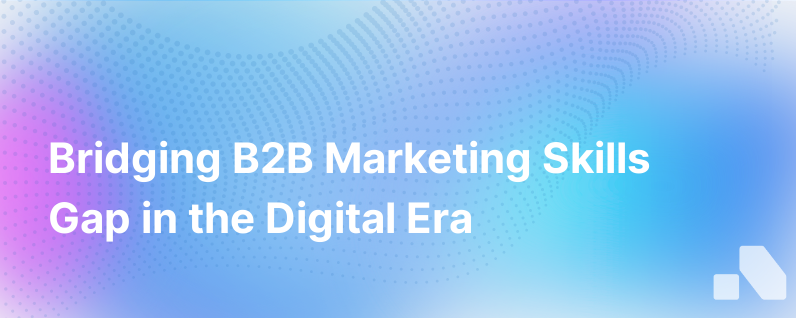Navigating The New Age B2B Marketing Skills Gap
Published on October 26, 2023 by Sawyer Middeleer
As the digital landscape continues to evolve at an unprecedented pace, B2B marketing organizations are encountering a significant challenge: a widening skills gap. This gap—between the skills B2B marketers currently possess and those they need to drive growth and innovation in a rapidly changing environment—is more than an HR dilemma. It's a strategic imperative that could determine the future success or failure of companies operating in the ever-competitive B2B space.
In this article, we will explore the nature of the new age B2B marketing skills gap, understand its implications, and offer insights on how to bridge this divide to ensure your team is ready to meet the demands of modern marketing.
Understanding the Skills Gap
The B2B marketing skills gap is the divide that exists when the skillset of the marketing workforce is misaligned with the demands of the current market environment. It encompasses everything from technical competencies related to digital tools and data analytics to soft skills such as leadership and strategic thinking.
Key forces driving the skills gap include:
- Rapid Technological Advancements: The acceleration of digital transformation initiatives has introduced a bevy of new tools and platforms that marketers must master.
- Changing Buyer Behaviors: B2B buyers now demand personalized, seamless, and value-driven interactions—expectations shaped by B2C experiences.
- Increased Focus on Data: With the expansive growth of data, marketers must be adept at collecting, analyzing, and leveraging insights to drive decision-making.
- The Rise of AI and Machine Learning: AI and machine learning are becoming vital for predictive analytics, personalization, and automating routine tasks.
- Cross-functional Integration: Marketing increasingly overlaps with sales, IT, and customer success, necessitating a collaborative and holistic approach.
- Shifts in Content Strategy: As thought leadership and content marketing continue to dominate, the need for high-level content strategy and creation skills grows.
The Implications of the Skills Gap
The consequences of a skills gap can be far-reaching, impacting everything from talent retention to business growth. Here's why addressing the skills gap is non-negotiable:
- Decreased Competitiveness: Without the necessary skills, companies struggle to adopt new technologies and strategies, losing ground to more agile competitors.
- Innovation Stagnation: A lack of skilled marketers can dampen creativity and innovation, preventing companies from capitalizing on emerging opportunities.
- Poor Customer Experience: Marketers lacking in modern skills may fail to deliver the high-quality, personalized experience B2B buyers now expect, which could negatively impact the customer journey and retention.
- Increased Recruitment Costs: Firms with skills gaps often find themselves in a constant cycle of hiring, as they need to source talent externally rather than developing it internally.
Bridging the Gap
So, what can organizations do to address the B2B marketing skills gap? Here are strategic steps to help bridge the divide:
Continuous Learning and Development
Invest in continuous learning opportunities for your employees. Encourage participation in online courses, webinars, and workshops that cover trending topics like AI, data analytics, or agile marketing practices. For instance, marketers could deepen their understanding of AI to harness predictive analytics or AI-driven content personalization—areas where tools like Aomni provide a competitive edge.
Cross-functional Training Initiatives
Promote cross-functional understanding by facilitating inter-departmental training sessions. This holistic approach helps align marketing objectives with broader business goals and fosters a cohesive strategy that traverses departments.
Integrate Tools that Simplify Complex Tasks
Implementing user-friendly tools can serve as a stop-gap measure by simplifying complex tasks. For example, platforms like Aomni can minimize the need for in-depth analytical skills by providing actionable insights through a user-friendly interface.
Cultivating a Culture of Innovation
Create an organizational culture that values continuous improvement and innovation. Encourage experimentation, celebrate calculated risks, and allow for the free exchange of ideas and strategies.
Upskill Your Workforce
Offer incentives for employees to upskill or reskill in critical areas. Whether it's gaining proficiency in using new marketing automation software or sharpening strategic content creation skills, empowering employees to grow will ensure that your team's capabilities evolve alongside market demands.
Hiring for Adaptability
In your recruitment processes, give higher weight to adaptability and a willingness to learn, alongside traditional qualifications. New hires with these attributes are more likely to thrive in a dynamic marketing landscape where change is the only constant.
Leverage Analytics and Automation
Embrace analytics tools and marketing automation to facilitate better marketing strategies and more personalized customer experiences. Investing in technologies that can automate routine tasks allows your marketing team to focus on more strategic activities.
Adopting a Strategic Approach
Addressing the skills gap is not just about training sessions or recruitment drives. It requires a strategic approach where skills development is aligned with business objectives. Here are three key strategies:
- Align Skills Development with Business Goals: Ensure that any skills development initiative is clearly tied to your organization's strategic objectives. This alignment guarantees that employees are developing in ways that directly contribute to your company's growth.
- Assess and Address the Specific Gap Areas: Use a data-driven approach to determine the specific skills lacking within your organization. Tailor your training and hiring to these specific needs, rather than taking a one-size-fits-all approach.
- Encourage a Learning Mindset: Inspire your team to adopt a growth mindset, where continuous learning is seen as a path to personal and organizational success.
Conclusion
As the B2B landscape continues to evolve, the skills gap in marketing becomes an increasingly pressing concern. By acknowledging the gap and taking proactive steps to narrow it, organizations can position themselves for success in the new age of marketing.
Remember, it’s not just about having the right skills; it’s about fostering a culture of continuous learning, innovation, and strategic thinking. With the right approach, B2B companies can transform this challenge into an opportunity for growth and competitive advantage.